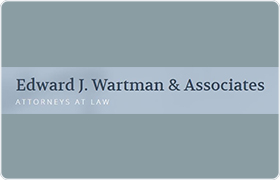Griffith Bankruptcy & Debt Lawyer, Indiana
Sponsored Law Firm
-
 x
x

Click For More Info:
-
Edward J. Wartman & Associates
516 East 86th Avenue Merrillville, IN 46410» view mapBankruptcy & Debt Law Highest Quality of Legal Services
At Edward J. Wartman & Associates Our experience runs deep and our successes are numerous, yet our motivation is simple.
219-791-1520
Nicole A. Bennett
Banking & Finance, Corporate, Collection, Constitutional Law
Status: In Good Standing
Christopher Schmidgall
Bankruptcy & Debt, Criminal, Traffic, DUI-DWI
FREE CONSULTATION
CONTACTShawn Douglas Cox
Litigation, Electronic Commerce, Health Care Other, Bankruptcy
Status: In Good Standing
Kevin Michael Schmidt
Wills & Probate, Family Law, Business, Bankruptcy
Status: In Good Standing Licensed: 37 Years
 Edward Wartman Merrillville, IN
Edward Wartman Merrillville, IN
